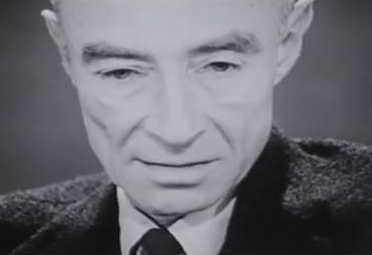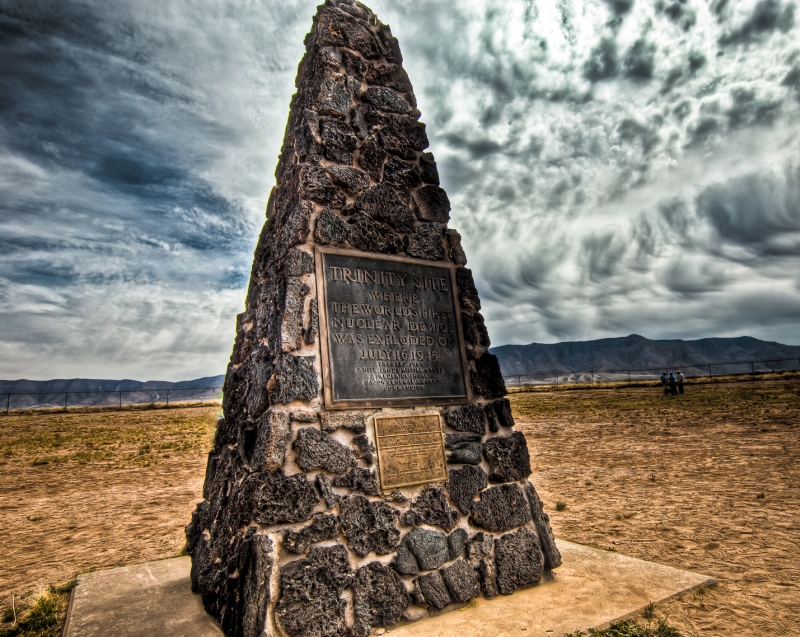File:Oppenheimer movie - 2023.jpg: Difference between revisions
Siterunner (talk | contribs) No edit summary |
Siterunner (talk | contribs) No edit summary |
||
| Line 11: | Line 11: | ||
July 20th, the day before the official release of the Oppenheimer movie... with an eye toward our GreenPolicy360/Strategic Demands work on nuclear risks and proliferation, the following are clips from Reviews of the movie that we believe | July 20th, the day before the official release of the Oppenheimer movie... and with an eye toward our GreenPolicy360/Strategic Demands work on nuclear risks and proliferation, the following are curated, selected clips from Reviews of the movie that we believe are especially worth reading. | ||
♦ | |||
Revision as of 22:03, 20 July 2023
Oppenheimer
The Movie / July 2023
♦
July 20th, the day before the official release of the Oppenheimer movie... and with an eye toward our GreenPolicy360/Strategic Demands work on nuclear risks and proliferation, the following are curated, selected clips from Reviews of the movie that we believe are especially worth reading.
♦
Via Variety
Christopher Nolan Says Some ‘Oppenheimer’ Viewers Walk Out ‘Devastated’ and ‘They Can’t Speak’: ‘It’s Kind of a Horror Movie’
One outspoken fan of “Oppenheimer” ahead of the film’s July theatrical release is historian Kai Bird, who co-wrote the 2005 biography “American Prometheus: The Triumph and Tragedy of J. Robert Oppenheimer” with Martin J. Sherwin. Nolan adapted the book into “Oppenheimer.”
“I am, at the moment, stunned and emotionally recovering from having seen it,” Bird said during a recent conversation. “I think it is going to be a stunning artistic achievement, and I have hopes it will actually stimulate a national, even global conversation about the issues that Oppenheimer was desperate to speak out about — about how to live in the atomic age, how to live with the bomb and about McCarthyism — what it means to be a patriot, and what is the role for a scientist in a society drenched with technology and science, to speak out about public issues.”
♦
Via the New Yorker
In 1954, America’s most celebrated scientist was falsely accused and publicly humiliated, sending a warning to all scientists not to engage in the political arena as public intellectuals. This was the real tragedy of the Oppenheimer case. What happened to him damaged our ability as a society to debate honestly about scientific theory—the very foundation of our modern world. Granholm’s courageous decision has reaffirmed not only that the federal government is capable of correcting its mistakes but that government employees, regardless of their stature, can express opinions that challenge the conventional wisdom without fear that they will be falsely branded as disloyal.
♦
Where to see 'Oppenheimer' on 70mm IMAX screens
♦
Via CNN
At the height of the Cold War, when mutually assured destruction was at its crazed height, nuclear warfare found itself abstracted through humor – perhaps the only reasonable way to treat something so fearsome. The bomb was a sick joke to be ridden, sometimes metaphorically, sometimes literally, a totem of mankind’s ingenuity and stupidity riveted shut and let fly. To look at it head-on was to be blinded by its glare; the power it wrought was too absurd — and too close — to countenance. Best to send in the clowns.
It would have seemed inconceivable then, but the atomic bomb did fade out of mind. In the 21st Century, other existential threats have reared their heads. Yet the nuclear threat feels closer today than it has for generations. And it’s precisely at this moment that Christopher Nolan is asking audiences to look it soberly in the eye.
“Our relationship with nuclear weapons is very complicated,” Nolan told CNN. “The fear ebbs and flows. It’s almost like humanity can only deal with one apocalypse at a time, and there’s so many issues to worry about.”
♦
Via the Associated Press
In 1954, a probing inquiry into Oppenheimer’s leftist politics by a McCarthy-era Atomic Energy Commission stripped him of his security clearance. This provides the frame of “Oppenheimer,” along with a Senate confirmation hearing for Lewis Strauss (Robert Downey Jr.), who chaired the Atomic Energy Commission and was a stealthy nemesis to Oppenheimer.
The grubby, political machinations of these hearings — the Strauss section is captured in black and white — act like a stark X-ray of Oppenheimer’s life. It’s an often brutal, unfair interrogation that weighs Oppenheimer’s decisions and accomplishment, inevitably, in moral terms. “Who’d want to justify their whole life?” someone wonders. For the maker of the world’s most lethal weapon, it’s an especially complicated question. These separate timelines give “Oppenheimer” — dimly lit and shadowy even in the desert — a noirish quality (Nolan has said all his films are ultimately noirs) in reckoning with a physicist who spent the first half of his life in headlong pursuit of a new science and the second half wrestling with the consequences of his colossal, world-altering invention.
♦
Via the New York Times
The movie, adapted from the Pulitzer Prize-winning biography “American Prometheus” by Kai Bird and Martin J. Sherwin, is the most recent in a stream of books, features and documentaries that have chronicled the tragic birth of atomic weapons, including another Pulitzer Prize winner, “The Making of the Atomic Bomb,” by Richard Rhodes; a seven-part BBC series, “Oppenheimer”; “Fat Man and Little Boy,” starring Paul Newman as Groves; another documentary, “The Trials of J. Robert Oppenheimer”; and even a John Adams opera, “Doctor Atomic.”
♦
Behind ‘Oppenheimer,’ a Prizewinning Biography 25 Years in the Making
Martin Sherwin struck the deal and dived into the research. But it was only when Kai Bird joined as a collaborator that “American Prometheus” came to be.
♦
NY Times Interview with the Director, Christopher Nolan
In production notes you say, “Like it or not, J. Robert Oppenheimer is the most important person who ever lived.” Why?
In Hollywood, we’re not afraid of a little hype. Do I genuinely believe it? Absolutely. Because if my worst fears are true, you’ll be the man who destroyed the world. Who’s more important than that?
Maybe the man who pushed the button that did destroy the world.
Got to have a button to push.
I think it’s very easy to make the case for Oppenheimer as the most important person who ever lived, because he is the person who facilitated and achieved atomic weapons and indeed the hydrogen bomb, because he let Teller work on it. So he is the individual who was able to marshal the forces effectively.
Is there a parallel universe in which it wasn’t him, but it was somebody else and that would’ve happened? Quite possibly. That’s the argument for diminishing his importance in history. But that’s an assumption that history is made simply by movements of society and not by individuals. It’s a very philosophical debate.
Apparently within about 15 minutes of hearing that the atom had been split, he was suggesting that you could make a bomb in a chain reaction. But I think a lot of scientists had that same, “Oh, this could be a bomb.”
His story is central to the way in which we live now and the way we are going to live forever. It absolutely changed the world in a way that no one else has changed the world. You talk about the advent of the printing press or something. He gave the world the power to destroy itself. No one has done that before.
♦
Via The Independent
The film is constructed in a way that allows its audience to comprehend, on an intellectual level, the profound power and chaos that led its central character to see himself as the “Death, destroyer of worlds” of Hindu scripture.
♦
Via the Vulture
When I was a kid, I thought if I could find a way to combine physics and New Mexico, my life would be perfect,” he muses while on one of his trips out there to ride horses through the mountains. Robert has it all for a while, though the price turns out to be so much higher than he could have imagined.
♦
Via the Chicago Sun-Times
A momentous achievement, year’s best movie
♦
Via the Hollywood Reporter
‘Oppenheimer’ Called the Best and Most Important Film This Century
♦
Via The Bulletin of Atomic Scientists
Oppenheimer's greatest tragedy was the success of his leadership in the creation of the weapon. His remarkable gifts as a physicist and as a human being were most realized in the building of a weapon that could lead to the destruction of humankind.
··················································
American Prometheus
The Book (Source material for the Movie)
··································
Via GreenPolicy360
- https://www.greenpolicy360.net/mw/index.php?title=Special:Search&search=nuclear%20weapons&fulltext=Policy+Search&profile=images&redirs=0
- https://greenpolicy360.net/w/Looking_Back:_At_Trinity,_the_First_Nuclear_Bomb_Test_-_1945
Strategic Demands (GreenPolicy360 Associate) -- http://www.strategicdemands.com
- https://strategicdemands.com/nuclear-issues-cold-war-2-0/
- https://strategicdemands.com/stewards-of-the-apocalypse/
·······························
Looking Back: At Trinity, the First Nuclear Bomb Test - 1945
File history
Click on a date/time to view the file as it appeared at that time.
| Date/Time | Thumbnail | Dimensions | User | Comment | |
|---|---|---|---|---|---|
| current | 18:08, 12 July 2023 |  | 600 × 768 (124 KB) | Siterunner (talk | contribs) |
You cannot overwrite this file.
File usage
The following 14 pages use this file:
- BigPicture Media
- GreenPolicy360 Archive Highlights 2023
- Green Stories of the Day
- Looking Back: At Trinity, the First Nuclear Bomb Test - 1945
- Nuclear Weapons
- Siterunner
- The Movement and the Madman - PBS - March 2023
- User talk:Siterunner
- File:100 seconds to midnight.jpg
- File:Einstein letter to Roosevelt - August 2, 1939.png
- File:Oppenheimer.png
- File:Oppenheimer -- the 2023 movie and in the 1940s.png
- File:Scene-oppenheimer-albert-einstein-1001343664.jpg
- File:Trinitite .jpg
- Anthropocene
- Extinction
- Green Graphics
- Green Politics
- Media
- Movies
- Online Education
- Nuclear Weapons
- Planet Citizen
- Planet Citizens
- Planet Citizens, Planet Scientists
- Threat Multiplier
- US
- Whole Earth
- Environmental Security
- Environmental Security, National Security
- Global Security
- National Security
- Nuclear Free
- Nuclear Nonproliferation
- Nuclear Proliferation
- Peace
- United Nations

